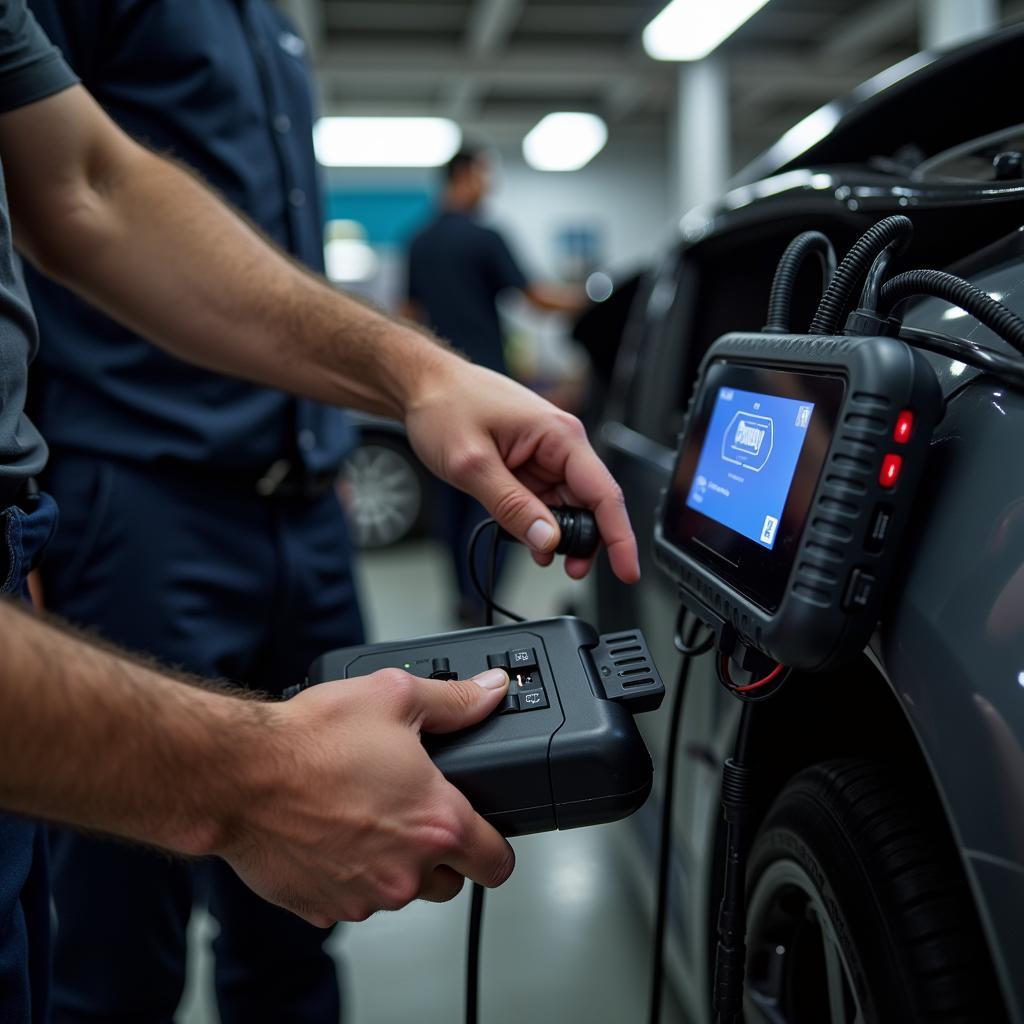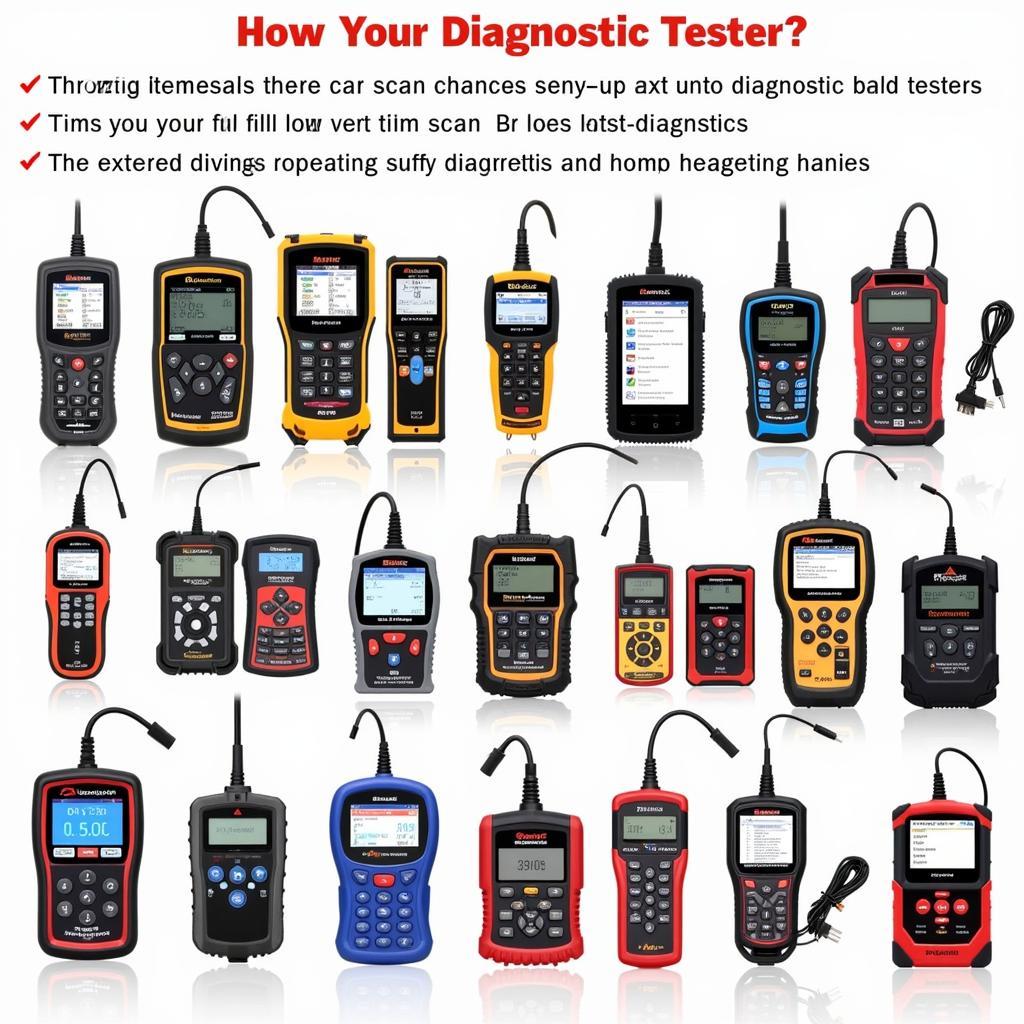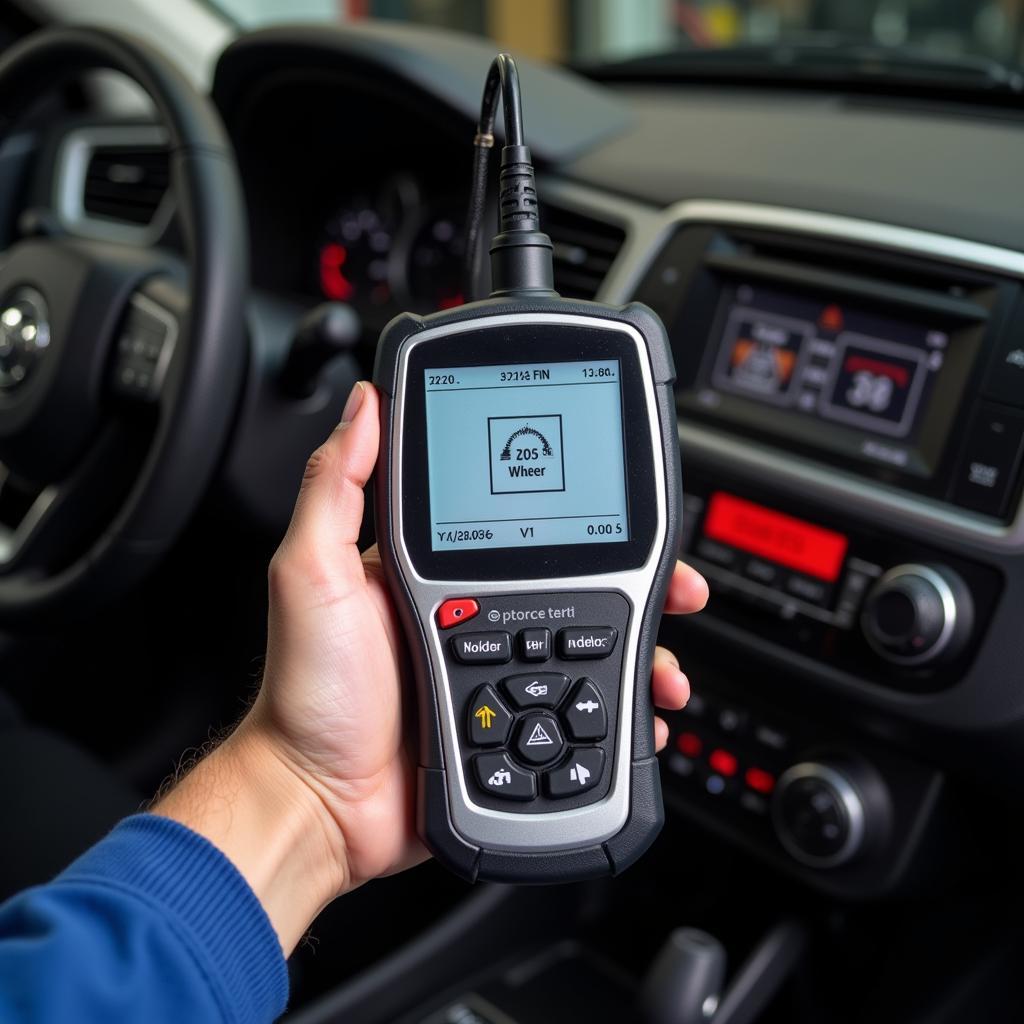Finding the right diagnostic tester for your automotive needs can feel like navigating a maze. With so many options available, each boasting different features and price points, making an informed decision requires careful research. This guide aims to equip you with the knowledge you need to choose the best diagnostic tester for cars for sale, whether you’re a seasoned mechanic or a DIY enthusiast.
Why Invest in a Car Diagnostic Tester?
Modern vehicles are complex machines reliant on intricate electronic systems. When issues arise, pinpointing the source of the problem often requires more than a visual inspection. This is where diagnostic testers for cars come in. These powerful tools act like a window into your car’s computer system, allowing you to:
- Retrieve Diagnostic Trouble Codes (DTCs): These codes, generated by your vehicle’s onboard computer, act as breadcrumbs, leading you to the root of the problem.
- Read and Analyze Live Data: Access real-time information from various sensors throughout your car, such as engine RPM, coolant temperature, and oxygen sensor readings, to gain a comprehensive understanding of your vehicle’s performance.
- Perform Actuator Tests: These tests help verify the functionality of various components like solenoids, relays, and motors, ensuring they respond correctly to commands from the car’s computer.
- Conduct System Resets: After repairs, a diagnostic tester enables you to reset the car’s computer and clear DTCs, ensuring smooth operation.
 Mechanic using a diagnostic tester on a car engine
Mechanic using a diagnostic tester on a car engine
Investing in a reliable diagnostic tester empowers you to take control of your vehicle’s maintenance and repairs, saving you time, money, and potential headaches in the long run.
Types of Diagnostic Testers for Cars
Navigating the world of car diagnostic testers requires understanding the different types available, each catering to specific needs and budgets:
1. Code Readers:
- Ideal for: DIY enthusiasts and car owners seeking basic diagnostic capabilities.
- Functionality: Primarily focuses on retrieving and clearing basic DTCs. Some models may offer limited live data viewing.
- Price Point: The most affordable option in the market.
2. OBD-II Scanners:
- Ideal for: Car enthusiasts and home mechanics seeking more advanced diagnostic features.
- Functionality: In addition to reading and clearing DTCs, OBD-II scanners can access and display a wider range of live data parameters. Some models offer bi-directional control for actuator tests.
- Price Point: A step up from code readers in terms of price, reflecting the enhanced functionality.
3. Professional-Grade Scan Tools:
- Ideal for: Professional mechanics and automotive repair shops requiring comprehensive diagnostic and programming capabilities.
- Functionality: Offers a complete suite of diagnostic functions, including advanced live data analysis, bi-directional control, module coding, key programming, and more. Often tailored to specific car makes and models.
- Price Point: The most expensive category, reflecting the advanced features and specialized capabilities.
 Various types of car diagnostic testers on a workbench
Various types of car diagnostic testers on a workbench
Factors to Consider When Choosing a Diagnostic Tester
Before purchasing a car diagnostic sale, consider the following factors to ensure you select the right tool for your needs:
1. Vehicle Compatibility:
- Make and Model: Ensure the diagnostic tester is compatible with the make, model, and year of your vehicle. Some testers specialize in certain brands, while others offer broader compatibility.
- OBD-II Protocols: Verify the tester supports the specific OBD-II protocols used in your vehicle.
2. Features and Functionality:
- DTC Reading and Clearing: Essential for all diagnostic testers.
- Live Data Streaming: Provides real-time insights into vehicle performance.
- Bi-Directional Control: Allows for component testing and system activation.
- Special Functions: Consider features like key programming, module coding, or ABS bleeding, depending on your needs.
3. User Interface and Ease of Use:
- Display: Opt for a tester with a clear, easy-to-read display, especially if you plan to use it in varying light conditions.
- Menu Navigation: A user-friendly interface with intuitive menu navigation enhances the overall experience.
- Software Updates: Regular software updates ensure compatibility with new vehicle models and evolving technology.
4. Budget:
- Define Your Price Range: Diagnostic testers come in a wide price range. Set a budget beforehand to narrow down your options.
- Balance Cost and Features: Consider the features you truly need and prioritize accordingly.
 A mechanic reviews data from a car diagnostic tester
A mechanic reviews data from a car diagnostic tester
“A well-chosen diagnostic tester is an investment, not an expense. It empowers you to understand your car better and make informed decisions about its maintenance.” – John Smith, Senior Automotive Technician
Conclusion
Selecting the right diagnostic tester for cars for sale requires careful consideration of your specific needs and budget. By understanding the different types available, the key features to look for, and your individual requirements, you can make an informed decision that empowers you to maintain your vehicle effectively and confidently.
FAQs
1. Can I use a diagnostic tester on any car?
While most modern cars utilize the OBD-II standard, compatibility can vary. Always check the tester’s specifications to ensure it supports your specific vehicle make, model, and year.
2. Do I need a professional-grade scan tool for DIY repairs?
For basic DIY tasks like reading and clearing DTCs, a code reader or OBD-II scanner might suffice. However, professional-grade tools offer advanced functionality and specialized capabilities essential for more complex repairs.
3. How often should I use a diagnostic tester on my car?
It’s a good practice to scan your vehicle periodically, even when no warning lights are illuminated. This proactive approach can help detect potential issues early on, preventing costly repairs down the road.
4. Can I update the software on my diagnostic tester?
Many diagnostic testers offer software updates to ensure compatibility with new vehicle models and features. Check with the manufacturer for information on updates and compatibility.
5. Where can I find reliable car diagnostic equipment for sale?
Reputable online retailers and automotive tool suppliers are good starting points for finding car diagnostic equipment for sale. Research different brands, compare features, and read reviews before making a purchase.
Need help finding the perfect car diagnostic tool? Our team of experts is available 24/7 to assist you. Contact us via WhatsApp: +1(641)206-8880, or Email: [email protected].

Leave a Reply